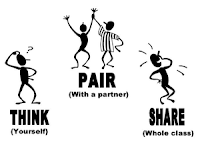Welcome back to my blog. I will be exploring my experiences in our Week 7 Mathematics J/I course. I will discuss a challenging activity that we did in class that I plan to use in my future classroom, strategies for helping ELL students in math that are useful to me and conceptual understanding of patterning and algebra.
Speed Dating
We started the class with "Speed Dating". This activity required us to work on our multiplication skills. We were given a worksheet that required us to multiply the number we were given by a partner's number. For example, my number was 98 and I multiplied this number with Mckenzie's, which was 14. I found this to be the most challenging part of the week because it involved multiplying two double-digit numbers together. I have not done this for a very long time, and I usually just multiply using my calculator. Therefore, I forgot how to actually multiply two double-digit numbers together. This resulted in my struggling and having difficulty filling out the worksheet. However, I will remember this activity and I plan to use it in my future classrooms because it is an interactive activity that involves math skills along with the life skills of communication and collaboration. Also, I think it is important to teach students to learn how to multiply without using a calculator and it is a skill that should be taught!


English Language Learners in Math

This week, I became aware that I could be teaching English language learners (ELL) in my future classrooms. This will be useful to me because I now have the basic information about working with ELL. ELL are students who come from a non-English speaking background and usually require modified instruction specific to their learning needs. Therefore, it is beneficial to incorporate strategies into the classroom setting that I will use to help ELL students in math. One strategy is to let the students work in pairs or small groups with other students who speak their language. This will allow them to discuss the problem in their language and work together to answer the questions. A second strategy is to use "think, pair, share", a collaborative learning strategy. This will enable students to have more time to think, consider and then rehearse their answer. A third strategy is to provide the students with differentiated texts. These texts can have the same key concepts, the vocabulary is simpler, the text is shorter and images can also be provided. This will allow students to be more active participants in the class. A fourth strategy is to allow the student to answer the question privately to the educator. This will create a less stressful situation than trying to answer the question in front of the whole class. A fifth is to avoid using different ways to say the exact same thing. This could be extremely confusing to the students. It is easier for them if one instruction is said so they can attempt to understand that instruction and attempt to follow it. However, a question I still have is what strategies would be used if the student speaks no English at all.



Conceptual Understanding of Patterning and Algebra

I will ensure that my students develop a conceptual understanding of patterning and algebra by giving students activities that involve everyday life. This will help them relate to the question more and therefore aid in their understanding. Explaining to the students that they are actually using algebra in their day to day life can help them feel more confident in their algebraic abilities. During a pattern lesson you can ask students to look for "repeating patterns in nature, for example flowers, gardens, and leaves, or in man-made products like clothing" (Small, 2013, p. 358). Also, I have attached a link that explores a
real life example using algebra.
 I will ensure that my students develop a conceptual understanding of patterning and algebra by giving students activities that involve everyday life. This will help them relate to the question more and therefore aid in their understanding. Explaining to the students that they are actually using algebra in their day to day life can help them feel more confident in their algebraic abilities. During a pattern lesson you can ask students to look for "repeating patterns in nature, for example flowers, gardens, and leaves, or in man-made products like clothing" (Small, 2013, p. 358). Also, I have attached a link that explores a real life example using algebra.
I will ensure that my students develop a conceptual understanding of patterning and algebra by giving students activities that involve everyday life. This will help them relate to the question more and therefore aid in their understanding. Explaining to the students that they are actually using algebra in their day to day life can help them feel more confident in their algebraic abilities. During a pattern lesson you can ask students to look for "repeating patterns in nature, for example flowers, gardens, and leaves, or in man-made products like clothing" (Small, 2013, p. 358). Also, I have attached a link that explores a real life example using algebra.









No comments:
Post a Comment